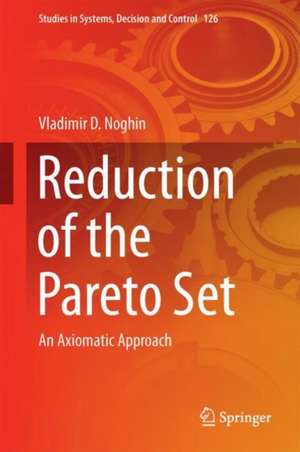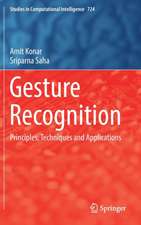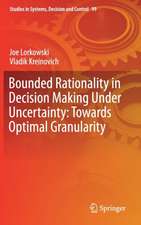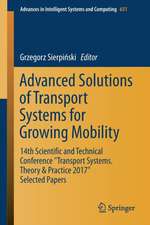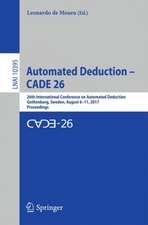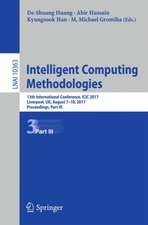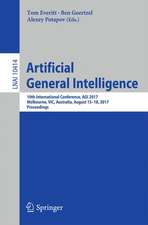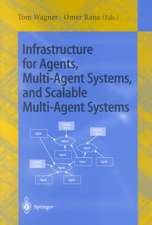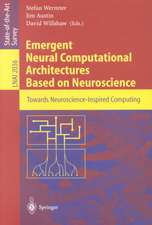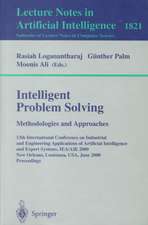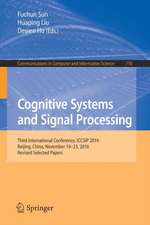Reduction of the Pareto Set: An Axiomatic Approach: Studies in Systems, Decision and Control, cartea 126
Autor Vladimir D. Noghinen Limba Engleză Hardback – 6 oct 2017
| Toate formatele și edițiile | Preț | Express |
|---|---|---|
| Paperback (1) | 589.93 lei 38-44 zile | |
| Springer International Publishing – 15 aug 2018 | 589.93 lei 38-44 zile | |
| Hardback (1) | 649.60 lei 6-8 săpt. | |
| Springer International Publishing – 6 oct 2017 | 649.60 lei 6-8 săpt. |
Din seria Studies in Systems, Decision and Control
- 18%
 Preț: 937.89 lei
Preț: 937.89 lei - 18%
 Preț: 729.53 lei
Preț: 729.53 lei - 20%
 Preț: 627.42 lei
Preț: 627.42 lei - 15%
 Preț: 644.18 lei
Preț: 644.18 lei - 18%
 Preț: 900.80 lei
Preț: 900.80 lei - 18%
 Preț: 947.35 lei
Preț: 947.35 lei - 20%
 Preț: 1467.93 lei
Preț: 1467.93 lei - 15%
 Preț: 646.30 lei
Preț: 646.30 lei - 18%
 Preț: 1012.84 lei
Preț: 1012.84 lei - 15%
 Preț: 653.33 lei
Preț: 653.33 lei - 9%
 Preț: 655.02 lei
Preț: 655.02 lei - 20%
 Preț: 835.24 lei
Preț: 835.24 lei - 18%
 Preț: 1112.30 lei
Preț: 1112.30 lei - 20%
 Preț: 934.27 lei
Preț: 934.27 lei - 24%
 Preț: 726.60 lei
Preț: 726.60 lei - 18%
 Preț: 1004.81 lei
Preț: 1004.81 lei - 20%
 Preț: 924.74 lei
Preț: 924.74 lei - 18%
 Preț: 1010.48 lei
Preț: 1010.48 lei - 20%
 Preț: 932.21 lei
Preț: 932.21 lei - 18%
 Preț: 1007.35 lei
Preț: 1007.35 lei - 18%
 Preț: 752.43 lei
Preț: 752.43 lei - 18%
 Preț: 1000.24 lei
Preț: 1000.24 lei - 18%
 Preț: 999.45 lei
Preț: 999.45 lei - 18%
 Preț: 1016.81 lei
Preț: 1016.81 lei - 18%
 Preț: 949.73 lei
Preț: 949.73 lei - 18%
 Preț: 1119.38 lei
Preț: 1119.38 lei - 18%
 Preț: 1412.20 lei
Preț: 1412.20 lei - 20%
 Preț: 1163.21 lei
Preț: 1163.21 lei - 18%
 Preț: 1116.26 lei
Preț: 1116.26 lei - 18%
 Preț: 783.20 lei
Preț: 783.20 lei - 18%
 Preț: 952.09 lei
Preț: 952.09 lei - 20%
 Preț: 1472.54 lei
Preț: 1472.54 lei - 18%
 Preț: 1392.46 lei
Preț: 1392.46 lei - 20%
 Preț: 1180.52 lei
Preț: 1180.52 lei - 18%
 Preț: 1567.67 lei
Preț: 1567.67 lei - 20%
 Preț: 984.18 lei
Preț: 984.18 lei - 20%
 Preț: 369.86 lei
Preț: 369.86 lei - 20%
 Preț: 1281.17 lei
Preț: 1281.17 lei - 18%
 Preț: 1582.67 lei
Preț: 1582.67 lei - 18%
 Preț: 1112.30 lei
Preț: 1112.30 lei - 20%
 Preț: 1055.94 lei
Preț: 1055.94 lei - 18%
 Preț: 1405.90 lei
Preț: 1405.90 lei - 18%
 Preț: 961.55 lei
Preț: 961.55 lei - 20%
 Preț: 1053.48 lei
Preț: 1053.48 lei - 20%
 Preț: 1049.37 lei
Preț: 1049.37 lei - 18%
 Preț: 1005.74 lei
Preț: 1005.74 lei - 18%
 Preț: 1225.94 lei
Preț: 1225.94 lei - 18%
 Preț: 1232.26 lei
Preț: 1232.26 lei
Preț: 649.60 lei
Preț vechi: 812.01 lei
-20% Nou
Puncte Express: 974
Preț estimativ în valută:
124.32€ • 129.31$ • 102.63£
124.32€ • 129.31$ • 102.63£
Carte tipărită la comandă
Livrare economică 14-28 aprilie
Preluare comenzi: 021 569.72.76
Specificații
ISBN-13: 9783319678726
ISBN-10: 3319678728
Pagini: 232
Ilustrații: XIX, 232 p. 24 illus.
Dimensiuni: 155 x 235 mm
Greutate: 0.53 kg
Ediția:1st ed. 2018
Editura: Springer International Publishing
Colecția Springer
Seria Studies in Systems, Decision and Control
Locul publicării:Cham, Switzerland
ISBN-10: 3319678728
Pagini: 232
Ilustrații: XIX, 232 p. 24 illus.
Dimensiuni: 155 x 235 mm
Greutate: 0.53 kg
Ediția:1st ed. 2018
Editura: Springer International Publishing
Colecția Springer
Seria Studies in Systems, Decision and Control
Locul publicării:Cham, Switzerland
Cuprins
Edgeworth-Pareto Principle.- Pareto set reduction based on elementary information quantum.- Pareto set reduction based on general information quantum.- Pareto set reduction using elementary collections of information quanta.- Pareto set reduction based on collections of information quanta.- Completeness property of information quanta.- Pareto set reduction using fuzzy information.- Decision-making based on information quanta: Methodology and Practice.
Textul de pe ultima copertă
This book focuses on the issues of decision-making with several numerical criteria. It introduces an original general approach to solving multicriteria problems given quantitative information about the preference relation of a decision-maker. It considers the problems with crisp as well as fuzzy preference relations, accepting the four axioms of “reasonable choice”. Further, it defines the notion of an information quantum about the preference relation of a decision-maker and studies the reduction of the Pareto set using a finite collection of information quanta, demonstrating that the original approach yields a good approximation for the set of nondominated alternatives in a multicriteria problem. Lastly, it analyzes a possible combination of the axiomatic approach with other well-known methods. Intended for a wide range of professionals involved in solving multicriteria problems, including researchers, design engineers, product engineers, developers and analysts, the book is also a valuable resource for undergraduate and postgraduate students of mathematics, economics, and engineering.
Caracteristici
Focuses on the issues of decision-making with several numerical criteria Introduces an original general approach to the solution of multicriteria problems given quantitative information about the preference relation of a decision-maker Intended for a wide range of professionals involved in solving multicriteria problems, including researchers, design engineers, product engineers, developers and analysts Includes supplementary material: sn.pub/extras
